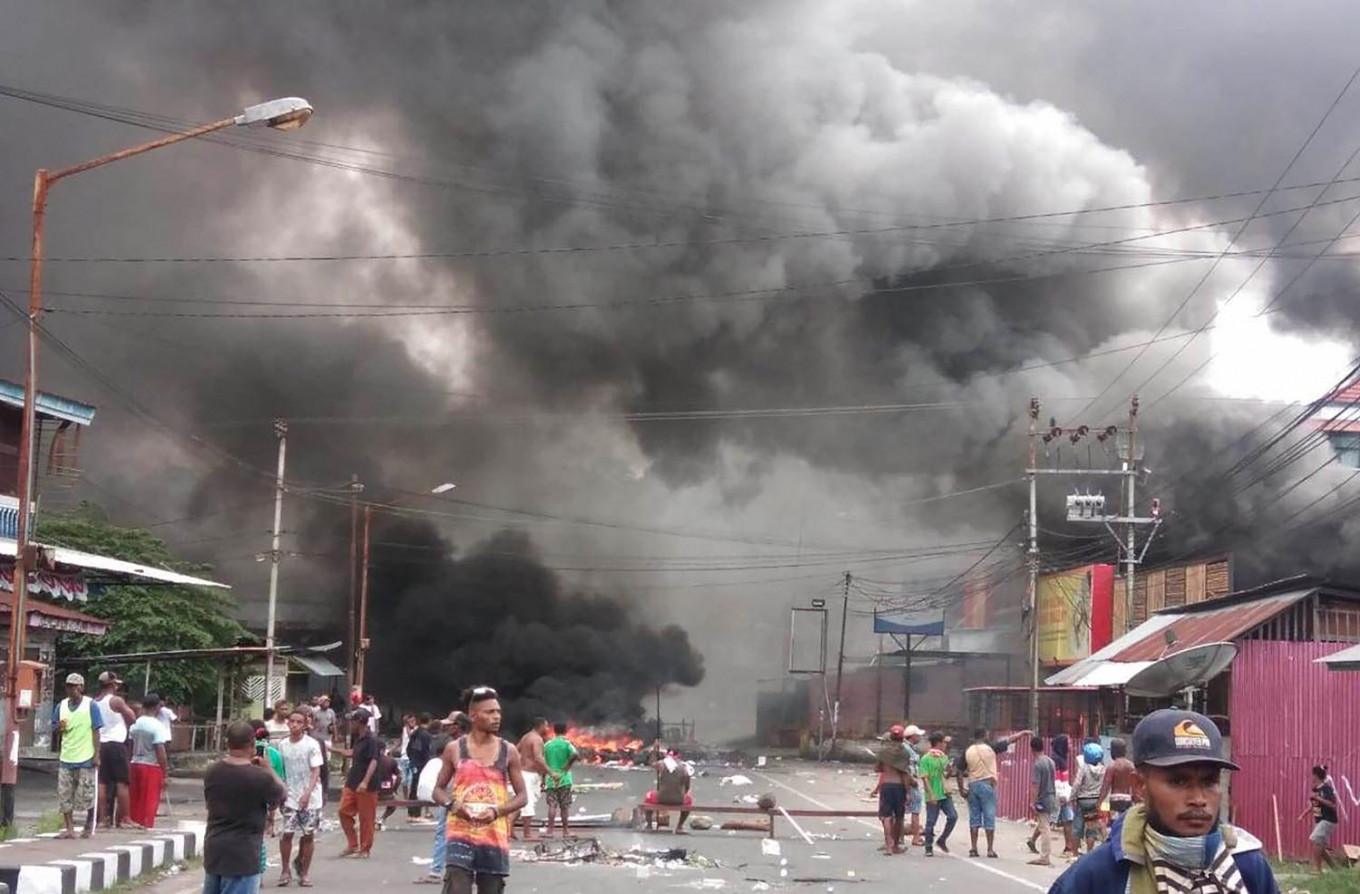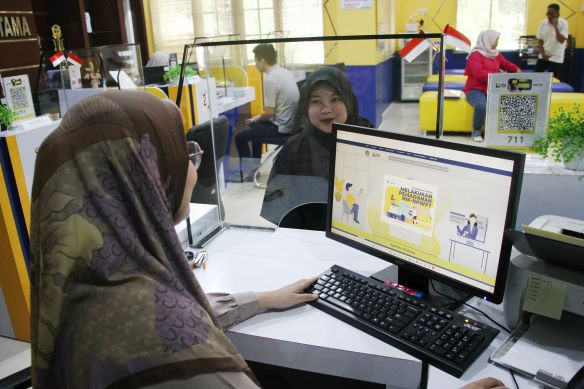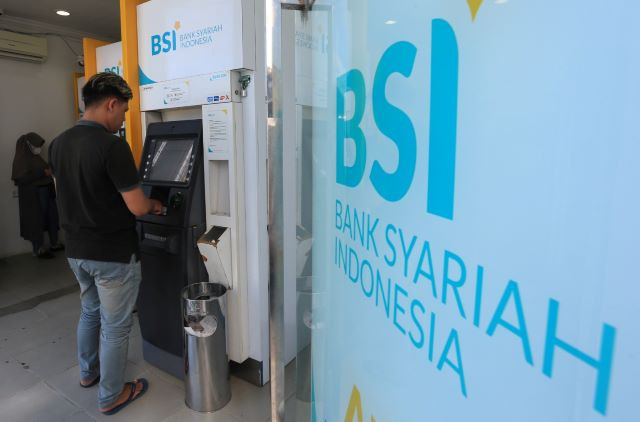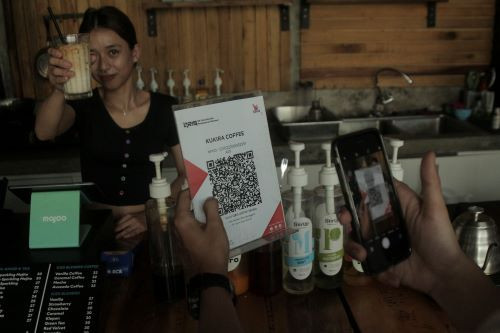Today's Minkes: Racism at heart of Jakarta-Papua conflict
Paraphrasing Noam Chomsky in his book Manufacturing Consent, in the eyes of the elites in Jakarta, Papuans are “unworthy victims”: unworthy of our outrage, unworthy of our attention, unworthy of a peaceful solution.
Change Size
 Protesters take to the street to face off with Indonesian police in Manokwari, Papua on August 19, 2019. Riots broke out in Indonesia's Papua with a local parliament building torched as thousands protested allegations that police tear-gassed and arrested students who supported the restive region's independence. (AFP/Str)
Protesters take to the street to face off with Indonesian police in Manokwari, Papua on August 19, 2019. Riots broke out in Indonesia's Papua with a local parliament building torched as thousands protested allegations that police tear-gassed and arrested students who supported the restive region's independence. (AFP/Str)
A
round Aug. 17 every year, Indonesians brim with nationalism. This year, one of the nationalism-evoking events was the launch of Bumi Manusia, a film by Hanung Bramantyo adapted from Pramoedya Ananta Toer’s legendary novel of the same title, about a love story between a young Javanese hero called Minke and the mixed-blood Annelies.
The bearer of the nickname believed that the name Minke, given by his condescending Dutch teacher, means “monkey”. The way the teacher said it, with bulging eyes and certain impatience, led Minke to believe he meant “monkey” not in a good way and he was called that because he was the only brown-skinned Javanese boy in the school.
While the fictional drama of colonial racism and love unfolds in big city cinemas, a real drama of racism, sans the love story, unfolds in Surabaya. The reaction was no less dramatic as on Monday dozens of Papuans in the West Papua capital of Manokwari vented their anger over the Surabaya incident while thousands rallied in the streets in Jayapura in Papua province.
According to a report from the Surabaya Legal Aid Institute (LBH Surabaya) on Friday, security officers in the East Java capital allegedly yelled “monkey” at students hailing from Papua for disrespecting Indonesian Independence day by reportedly damaging an Indonesian flag in front of their dorm.
Dozens of Papuan students were reportedly locked in and denied food even when two non-Papuan students attempted to deliver food to them. These two people were arrested by the police, LBH Surabaya said.
On Aug. 17, military, police and public order officers and members of mass organizations gathered in front of the dorm, some of them shouting: “Banish the Papuans!” Later, the police arrested 43 students living in the dorm, after they shot tear gas into the building.
Like Minke, Papuans are said to have endured racial discrimination from the majority Javanese. A political activist from Papua, Filep Karma, wrote in 2014 in his book, Seakan Kitorang Setengah Binatang: Rasialisme Indonesia di Tanah Papua (As If We Are Half Animal: Indonesia’s Racism in Papua Land), that he experienced racism when he studied in a state university in Surakarta, Central Java. He often heard his friends called Papuans “monkeys”, he said in the book.
The book speaks volumes of the crimes against humanity facing Papuans on their own land.
On Wednesday, a team consisting of members of human rights NGOs, Papuan churches and the Nduga regency administration reported on their fact-finding work about conflicts between the Indonesian Military and Papuan armed groups in the outlying regency. They discovered that at least 182 people, mostly women and children, died, some at the hands of the security forces. Many others died of hunger or sickness while fleeing their conflict-ridden villages.
If such a tragedy had happened on Java, it would quickly have outraged many, even President Joko “Jokowi” Widodo, but the deaths in Nduga just happened quietly. Worse, the deaths were not the first or only tragedy. Many more civilians have fallen victim to Jakarta’s security approach in Papua, where sporadic armed movements to secede from Indonesia have been underway for decades.
In July last year, Amnesty International Indonesia released a report saying at least 95 civilians had been killed since 2010.
"Papua is one of Indonesia’s black holes for human rights. This is a region where security forces have for years been allowed to kill women, men and children, with no prospects of being held to account," Amnesty Indonesia executive director Usman Hamid said in a statement last year.
Paraphrasing Noam Chomsky in his book Manufacturing Consent, in the eyes of the elites in Jakarta, Papuans are “unworthy victims”: unworthy of our outrage, unworthy of our attention, unworthy of a peaceful solution.
Many non-Papuans would just accept the statement as normal. Under the pretext of nationalism, they may think Papuans have no right to be outraged. After all, some would say: “We give them roads, development and a lot of special autonomy funds.”
It is true that the central government has since 2002 transferred special autonomy funds amounting to 2 percent of the General Allocation Fund to Papua (including West Papua). The transfers are to end in 2021, according to the 2001 Law on Special Autonomy for Papua.
However, we fail to give the Papuans respect they deserve and recognition that they are equal to us. As citizens of Indonesia, they have equal opportunity to protest when they think they are being treated unfairly. Of course, such failure only amounts to racism.
Non-Papuans, the majority, would say Papuans, the minority, have no right to call for justice or determine their future after the relentless acts of violence, injustice and racism they have endured for decades. Unless they find peace, justice and prosperity, they will consider living in the Unitary State of the Republic of Indonesia merely a rhetorical statement.
Just like the Dutch teachers who looked down on Minke in Bumi Manusia, we may need to do some honest soul searching to admit that some of us scorn Papuans because of their skin color.
Papuans deserve peace and prosperity on their rich land and without eradicating our racism against them, there would never be peace in Papua.
Racism in the love story in Bumi Manusia is the prequel to Indonesia’s budding nationalism against the occupation of the Dutch before our independence in 1945. Surely, we would not want the racism befalling Papuans to pave the way for their struggle for independence from “Indonesian occupation” on their land.









